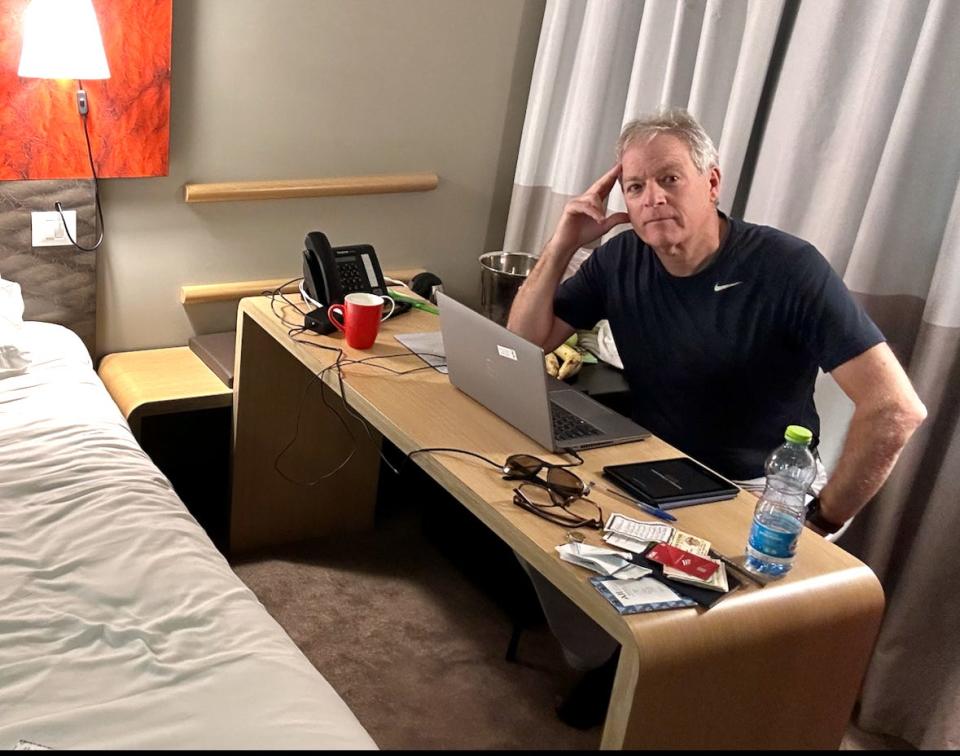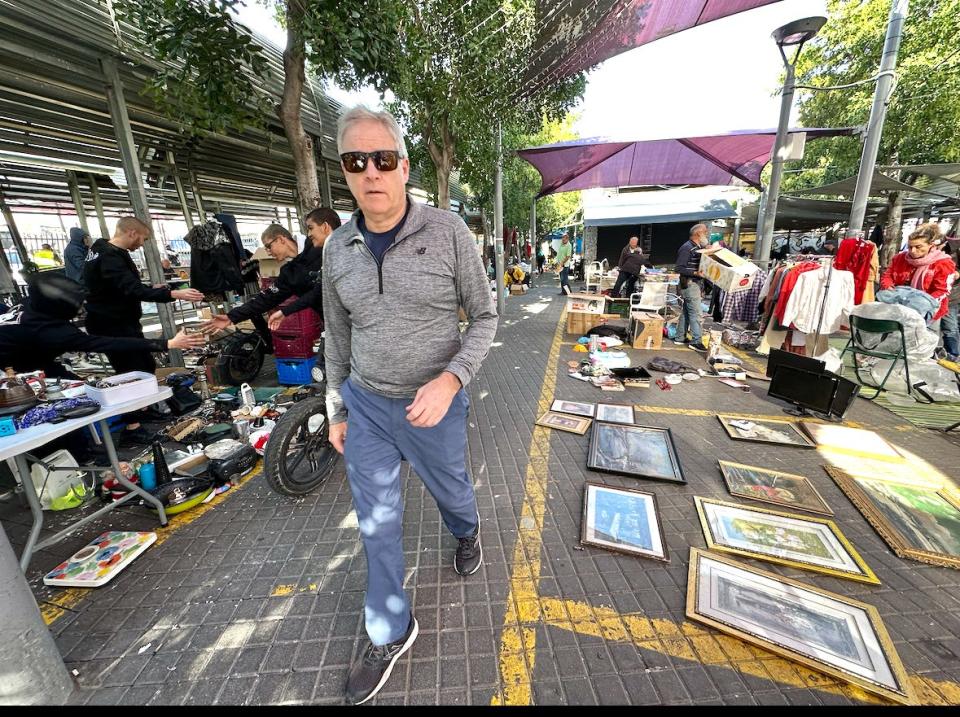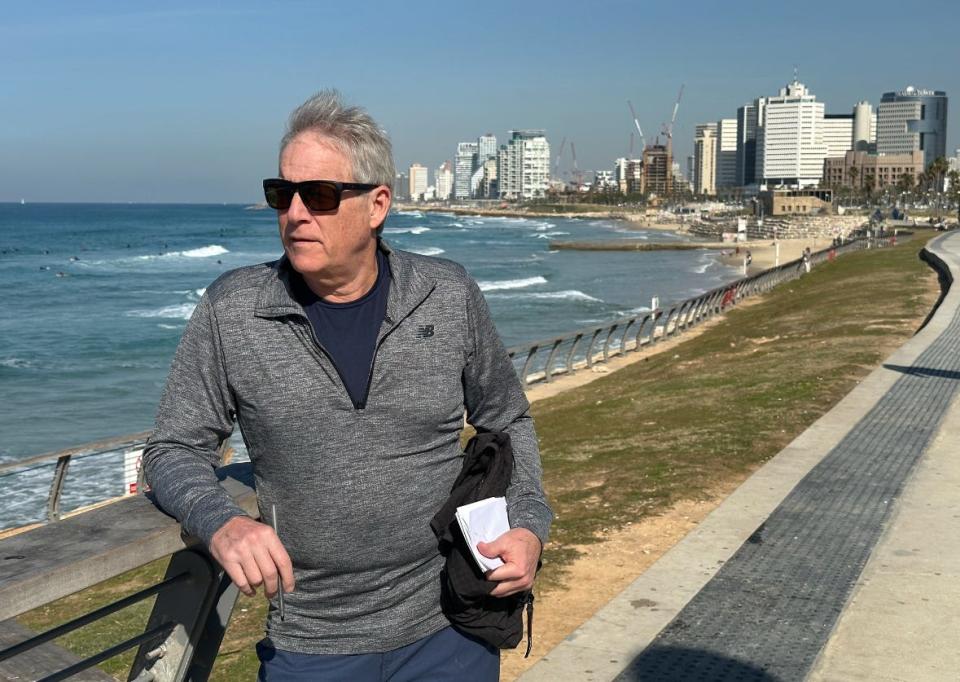Mark Patinkin in Israel: Exhaustion and persistence pay off with clearance into Gaza
I felt it important to try to see the war itself.
There was one main option – embedding with the Israeli military.
Critics will say that’s a staged show, but it’s how reporters see many conflicts, and our role is to witness however we can.
I learned quickly the odds were long.
The Israel Defense Forces Media Desk said they would put me on a list but couldn’t promise. Such trips don’t happen often, and when they do, seats in the Humvees are limited.
As my days here go by, I start to pull as many strings as I can. The guide I hired knows a retired general and can have him call for me. I ask other contacts to put in a word through their connections. Mostly, I message the IDF media people every day. You need to stay on their radar.
Finally, a week in, I received a message through WhatsApp saying there could be a Gaza embed the next morning. But hours later, it’s bumped a day, and another, and then nothing happens. The war is like that. The IDF has other things to worry about besides reporters.

My push to see the war isn’t the trip’s only challenge.
I arrived in Israel 100 days after Oct. 7, and learned this can be a breakpoint. A lot has been made of that milestone here; it reminds everyone of how much they’ve been through, and the toll.
One example: More than a few hostage families I had asked for interviews decided at the last minute it was too much for them. Setting up a visit to a destroyed Kibbutz was hard, too. Understandably, they want it done with dignity, with survivors offering a limited number of tours each day. It took a week to be granted a spot.
Other ideas simply didn’t work out. It’s one of the perils of journeying to a place in upheaval and trying to find your way.
One idea was to talk to Israeli Arabs with family in Gaza. How was the war impacting them? I was told to look in Jaffa, the ancient city north of Tel Aviv. During the 1948 war, many Arabs from there fled to Gaza – that was their escape route. Might families who stayed in Jaffa still be there?
I went to find out, walking through Arab souks to ask about Gazan relatives. But 76 years is a long time, and unlike the West Bank and Gaza itself, where people cling to 1948 like it was yesterday, here, many have moved on.
Even Mahmoud had.
I found him in a Jaffa flea market selling everything from old vases to burnt pans. He’s in his 60s and had what I was looking for – brothers and sisters in Gaza. They’d moved there from Israel decades ago, as did Mahmoud to run a business, but he came back. Yet he told me he hadn’t talked to them in a year or two.

Is he afraid for them now? Angry about the war?
Everything, Mahmoud said simply, is part of Allah’s greater plan. Politely, he added that’s all he’d like to say about it – were there any items he could sell me?
When I approached others in the souk saying I was a journalist, they didn’t want to talk. For many Israeli-Arabs, it’s delicate. They worry how Israeli authorities will react if they criticize the war, and how Palestinians will if they don’t.
I’m sure there are folks in Jaffa who’ve lost loved ones in Gaza, but I didn’t find them that day.
Yet as long as you get out in the field, you’ll often come across something else. I moved on to Hostage Square in nearby Tel Aviv, where I found poignant interviews with parents of the taken.
For the first day and a half, I was here with a Rhode Island mission, but the two weeks since have been on my own.
Some of those nights have been lonely, in part because I was sending back live dispatches every day, leaving little time to take breaks with those I’ve begun to connect with. You need to reserve your evenings to write.
So there have been periods of exhaustion, like a long, two-bus dance coming back late from the West Bank, getting off at a checkpoint, then waiting in the dark for a second bus to Jerusalem. Just after I boarded that one, I got messages that my next day’s plans had fallen through.
The latest: Militants tied to deadly drone strike say they will halt attacks on US troops
That can take a mental toll, putting thoughts in your head that you’re failing. I’ve had many low moments around that. Self-doubt can be a motivator, but also a difficult companion. This is not the kind of trip you want to do if you’re going through a bad time.
But now, with only days left here, a WhatsApp text has just arrived.
It’s from an IDF media contact.
A journalist’s trip into Gaza is on for the next morning, and I’ve been granted a space. She gives me the location of a deployment spot to meet just outside the fence along the strip, two hours from Jerusalem, where I’m staying.

I’m still expecting it to be canceled – a hard rain is forecast.
But when I wake up, it’s confirmed.
Within hours, I will be inside Gaza.
Mark Patinkin is traveling to Israel personally and is not sponsored by or affiliated with any organization. He will report firsthand from the region as he has done for the last four decades through his award-winning journalism. He can be reached at mpatinki@providencejournal.com.
This article originally appeared on The Providence Journal: Looking back at Mark Patinkin's trip to Israel with Gaza embed nearing

